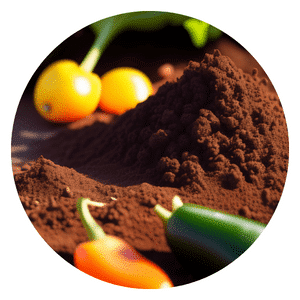How to compost Chicken Manure?
Chicken manure is a valuable resource for gardeners and farmers alike, providing essential nutrients to enrich the soil and promote healthy plant growth.
However, improper handling or disposal of this waste can lead to environmental pollution and health risks.
Composting chicken manure is an effective way to harness its benefits while minimizing potential drawbacks.
In this article, we will explore the step-by-step process of composting chicken manure, highlighting crucial considerations and offering practical tips for successful decomposition.
Whether you are a seasoned gardener looking to enhance your soil fertility or a beginner eager to make use of chicken waste sustainably, read on to discover the secrets of turning chicken manure into black gold for your plants.

Chicken Manure Menu
Collect the manure
Collecting the manure from the chicken coop is an essential step in composting chicken manure.
It is important to remove not only the droppings but also any bedding material, such as straw or wood shavings, that may have been soiled by the chickens.
Bedding material adds carbon to the compost pile and helps with moisture absorption.
However, it is crucial to avoid collecting any soiled bedding that may contain pathogens or chemicals that could potentially contaminate the compost.
When collecting the manure and bedding, it is recommended to wear gloves and a dust mask to protect yourself from potential pathogens present in the droppings.
You can use a shovel or rake to gather all the material and transfer it into a container or wheelbarrow for easy transportation.
Be careful not to mix clean bedding with soiled materials while collecting, as this can increase the risk of contamination.
Once you have collected all the manure and clean bedding, you can then proceed with composting them properly.
Composting chicken manure allows for its transformation into nutrient-rich organic matter that can be used in gardening or agricultural activities safely.
However, proper collection techniques must be followed diligently to ensure a healthy and safe composting process.
Create a compost pile or bin
One important aspect of composting chicken manure is to create a suitable location for your compost pile or use a compost bin.
It is crucial to choose an appropriate spot that allows for good airflow and drainage. This will help in the decomposition process and reduce the chances of bad odors or pests.
When selecting a location, consider placing your compost pile or bin in an area that receives partial sunlight. Avoid placing it near trees or buildings, as this may hinder proper airflow.
Additionally, ensure that the chosen spot has good drainage to prevent waterlogging, which can lead to anaerobic conditions and unpleasant smells.
In terms of using a compost bin specifically for chicken manure, opt for one that is made of sturdy materials like plastic or wood. This will help contain the manure and provide insulation to regulate temperature fluctuations.
Remember to regularly turn the contents inside the bin with a garden fork or shovel to promote even decomposition and airflow throughout the pile.
By following these guidelines and creating an ideal environment for your compost pile or bin, you can successfully compost chicken manure while minimizing any potential issues that may arise during the process.
Layer the compost materials
Layering the compost materials is an essential step in effectively composting chicken manure.
To begin, it is recommended to start with a layer of carbon-rich materials such as dry leaves, straw, or shredded newspaper. These components help create a balanced carbon-to-nitrogen ratio and prevent the compost from becoming too compacted.
Once the carbon layer is established, it is time to add a layer of chicken manure on top.
Chicken manure is rich in nitrogen and other essential nutrients that are beneficial for plant growth.
However, using it directly without proper preparation can lead to an imbalance in the compost pile.
By adding a thin layer of chicken manure on top of the carbon-rich materials, you ensure that there is enough nitrogen present for the decomposition process while maintaining a well-balanced environment for microorganisms.
The combination of carbon-rich materials and chicken manure provides an ideal environment for microbial activity and accelerates the breakdown process.
It also helps prevent any foul odors that may arise from decomposing organic matter.
Layering these components correctly ensures that your chicken manure compost will be well-balanced, nutrient-rich, and ready to be used as fertilizer for your garden or plants throughout your backyard.
In nature's circle, synergy thrives, Where farmers tend their humble hives. To compost chicken manure with grace, Let's follow steps that time won't erase. Start with a bin, strong and secure, Add golden waste and leaves, mature. Mix soil and patience, harmonize, And voila! Nurturing compost arise.
Chappy The Gardener
Moisture management
Adding additional organic materials to your compost pile is crucial in order to achieve a balanced carbon-to-nitrogen ratio.
Chicken manure is rich in nitrogen, but it can be too concentrated and lead to an imbalance if used alone.
By adding alternate layers of chicken manure with other organic materials like kitchen scraps, grass clippings, or garden waste, you can create a more nutrient-rich compost.
Kitchen scraps such as vegetable peelings or leftover fruit provide a good source of carbon.
Grass clippings are another excellent addition as they contain high levels of nitrogen.
Similarly, garden waste such as leaves or pruned branches contribute to the carbon component and bring additional nutrients to the mix.
By layering these materials with chicken manure, you ensure that there is a proper balance between carbon and nitrogen elements in your compost pile.
This mixture not only helps maintain the right conditions for decomposition but also promotes beneficial microorganisms’ growth that break down the organic matter into rich humus.
As these organisms require both carbon and nitrogen to thrive, the alternating layers provide them with a diverse diet, resulting in faster decomposition rates and ultimately yielding high-quality compost for your plants’ nourishment.
Moisture management
When composting chicken manure, moisture management is crucial to ensure a successful process.
Chicken manure tends to be high in nitrogen, which can cause it to become overly wet and compacted if not managed properly.
To maintain proper moisture levels in the compost pile, it is important to monitor the dampness of the materials used.
The ideal moisture level should be similar to a wrung-out sponge, where the materials are moist but not dripping with excess water.
If the compost pile becomes too dry, it can hinder decomposition and slow down the breakdown of organic matter.
In such cases, adding water to the pile will help rehydrate the materials and facilitate microbial activity.
It is advisable to use a sprinkler or gently spray water over the pile rather than pouring large amounts at once, as this may lead to oversaturation.
On the other hand, during heavy rainfalls or periods of excessive precipitation, covering the compost pile can prevent it from becoming overly saturated.
A waterproof tarp or cover can shield it from direct exposure to rainwater while still allowing for proper aeration.
Maintaining proper moisture levels in your chicken manure compost pile is essential for achieving optimal conditions for decomposition and creating nutrient-rich compost for your garden.
By regularly monitoring and adjusting moisture levels as needed, you can ensure a well-balanced environment that supports efficient breakdown of organic matter while minimizing any potential issues related to excess wetness or dryness.
Turn the compost
One important step in composting chicken manure is to regularly turn the compost pile.
By using a pitchfork or garden fork, you can easily mix and aerate the pile, ensuring that oxygen reaches all parts of it.
This promotes the growth of beneficial bacteria and fungi that break down organic matter more efficiently.
Additionally, turning the compost helps to accelerate decomposition, as it creates a more balanced environment for microorganisms to thrive.
Regularly turning the compost pile also plays a crucial role in preventing odors that may arise from decomposing chicken manure.
The act of mixing and exposing different layers of the pile to air helps reduce anaerobic conditions, which can lead to unpleasant smells.
Moreover, by ensuring proper aeration through regular turning, you create an environment where aerobic bacteria can thrive and effectively break down organic materials into nutrient-rich compost.
In summary, turning the compost every few weeks using a pitchfork or garden fork when composting chicken manure is essential for several reasons.
It helps aerate the pile by allowing oxygen to reach all parts of it, accelerating decomposition and promoting efficient breakdown by beneficial microorganisms.
Furthermore, regular turning prevents odors by reducing anaerobic conditions and creating an optimal environment for aerobic bacteria to flourish.
Monitor the temperature
Monitoring the temperature of your compost pile is crucial when composting chicken manure.
The microbial activity in the pile generates heat, which aids in the decomposition process.
To ensure efficient breakdown of the manure and other organic materials, it is recommended to aim for a temperature range of 130-150°F (54-66°C). This optimal temperature range allows for faster decomposition and helps kill any potential pathogens present in the chicken manure.
Regularly checking the temperature of your compost pile can be done using a compost thermometer. Insert the thermometer into different areas of the pile, making sure to reach its core.
If you find that the temperature falls below 130°F (54°C), you may need to turn or aerate your compost to provide more oxygen to fuel microbial activity and increase heat production.
On the other hand, if temperatures exceed 150°F (66°C), this may indicate excessive microbial activity, which can lead to nitrogen loss or even spontaneous combustion.
In such cases, it is important to carefully monitor and regulate moisture levels by adding water or adjusting carbon-to-nitrogen ratios by adding more dry materials like straw or sawdust.
By closely monitoring and maintaining an adequate temperature range during chicken manure composting, you can ensure that your pile decomposes efficiently while minimizing risks associated with pathogens or excessive heat buildup.
Composting time
Composting chicken manure can be a great way to utilize this rich source of nutrients and create a valuable organic fertilizer for your garden.
However, it is important to understand that composting time for chicken manure may vary depending on certain factors.
The size of the compost pile plays a crucial role in determining the duration of the process. Generally, smaller piles tend to decompose faster compared to larger ones.
Moisture levels are another key factor impacting the composting time.
Chicken manure contains high levels of nitrogen, which makes it quite wet and can slow down the decomposition process if not managed properly.
It is essential to maintain adequate moisture levels by regularly turning and aerating the pile, as excessive moisture can lead to unpleasant odors and hinder proper decomposition.
Temperature also influences how long it takes for chicken manure to fully break down into compost.
A higher temperature within the pile speeds up microbial activity, resulting in faster decomposition.
However, extreme temperatures (too hot or too cold) can negatively affect the composting process.
Curing
Curing the finished compost is an essential step in the composting process, especially when it comes to using chicken manure as a compost ingredient.
Chicken manure is rich in nitrogen, phosphorus, and potassium, which are valuable nutrients for plants.
However, if not properly cured, the high nitrogen content can burn plant roots and damage delicate seedlings.
During the curing period, microorganisms continue to decompose any remaining organic matter in the compost pile.
This decomposition process helps eliminate potential pathogens and weed seeds that may be present in chicken manure.
Additionally, curing allows time for the breakdown of excess nitrogen into forms that are more readily available for plant uptake.
By allowing the compost to cure for a few weeks before using it in your garden or applying it to plants, you ensure that it is fully matured and stable. This stabilization process further maximizes nutrient availability and reduces the risk of nutrient imbalances or burning plants with excessive nitrogen levels.
Ultimately, properly cured chicken manure compost can provide your garden with a rich source of organic matter and essential nutrients while promoting healthy plant growth without any adverse effects.
Application
Once you have successfully composted your chicken manure, it is time to put it to use in your garden beds or around plants.
When applied as a fertilizer, composted chicken manure is an excellent organic option that provides numerous benefits for your soil.
Firstly, the nutrients present in the manure act as a natural source of fertilizer, enriching the soil with essential elements like nitrogen, phosphorous, and potassium. This nutrient-rich composition promotes healthy plant growth and development.
Moreover, when added to the soil, composted chicken manure also helps improve its structure.
The organic matter in the manure enhances soil texture by increasing its water-holding capacity and promoting better drainage. This means that your plants will have access to adequate moisture while preventing excessive waterlogging that can harm their roots.
Additionally, incorporating composted chicken manure into your garden beds or around plants improves soil fertility over time.
As it breaks down further in the soil, it releases additional nutrients gradually while enhancing microbial activity. This creates a sustainable cycle of nutrient availability for your plants and contributes to long-term soil health.
Applying composted chicken manure as an organic fertilizer offers multiple advantages for your garden beds or plantings.
Its nutrient content supports robust plant growth while simultaneously improving soil structure and fertility over time.
By utilizing this natural resource wisely in your gardening practices, you can enjoy healthier and more productive gardens while minimizing reliance on synthetic fertilizers.
Safety precautions
When it comes to composting chicken manure, safety precautions are of utmost importance.
One crucial measure is to always practice proper hygiene before and after handling the manure. This includes washing your hands thoroughly with soap and water after working with the compost.
Chicken manure can contain harmful bacteria such as salmonella or E.
coli, which can cause serious illnesses if ingested.
Another safety precaution to keep in mind is to avoid direct contact with the compost during the curing period.
The curing process involves allowing the manure to decompose over time, which generates heat that helps kill pathogens and weed seeds present in the material.
Direct contact with this hot compost could result in burns or skin irritations.
It is recommended to use a pitchfork or shovel while turning or mixing the pile instead of using bare hands.
By following these safety precautions, you can ensure that you protect yourself from potential health hazards associated with handling chicken manure during composting.
Remember, maintaining proper hygiene practices and avoiding direct contact will minimize any risks involved in this process and promote a safe environment for both you and your plants.
Adjustments
When composting chicken manure, it is important to make adjustments as needed to ensure successful decomposition.
One common issue that may arise is an unpleasant odor coming from the compost pile. This can be a result of too much nitrogen in the mixture.
To balance the nitrogen content, it is recommended to add more carbon-rich materials such as straw, leaves, or sawdust. These materials will help absorb excess moisture and neutralize the smell.
Another adjustment that may need to be made when composting chicken manure is ensuring proper moisture levels in the pile.
If the compost becomes too dry, it can slow down decomposition and hinder microbial activity.
To increase moisture levels, adding water periodically is necessary.
It’s important not to overdo it though, as excessive water can lead to anaerobic conditions and create an unpleasant odor.
By making these adjustments when needed, composting chicken manure can be a successful process with minimal odor and maximum decomposition efficiency.
In conclusion, composting chicken manure is a beneficial and sustainable practice that can greatly improve soil health and promote environmental sustainability.
By following the steps outlined in this article, you can successfully compost chicken manure and harness its nutrient-rich properties for your garden or farm.
Remember to maintain the ideal moisture and temperature levels, turn the pile regularly, and ensure proper aeration to facilitate decomposition.
Additionally, monitor the compost regularly to ensure it is reaching the desired finished product.
With some patience and diligence, you can transform chicken manure into a valuable resource that nourishes your plants and reduces waste.
Start composting chicken manure today and join the movement towards greener gardening practices!
Click To Grow
Helps Us Grow – Share If You Like
















